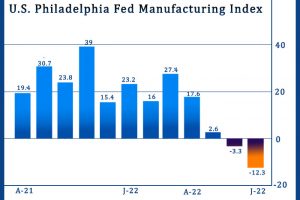Philly Fed Index Unexpectedly Slumps Further Into Negative Territory In July

A report released by the Federal Reserve Bank of Philadelphia on Thursday showed regional manufacturing activity unexpectedly contracted at a faster rate in the month of July.
The Philly Fed said its current general activity index slumped to a negative 12.3 in July from a negative 3.3 in June, with a negative reading indicating a contraction in regional manufacturing activity.
The continued decrease by the Philly Fed index came as a surprise to economists, who had expected the index to rebound to a positive 0.4.
While a majority of firms reported no change in activity, 24 percent reported decreases in activity compared to the 12 percent that reported increases.
The unexpected drop by the headline index also reflected an accelerated contraction in new orders, with the new orders index plunging to a negative 24.8 in July from a negative 12.4 in June.
The number of employees index also slumped to 19.4 in July from 28.1 in June, hitting its lowest reading since May 2021.
Meanwhile, the Philly Fed said the shipments index climbed to 14.8 in July from 10.8 in June, indicating a faster rate of growth.
The report also showed a slowdown in the pace of price growth, as the prices paid index tumbled to 52.2 in July from 64.5 in June and the prices received index dove to 30.3 in July from 49.2 in June.
Looking ahead, the Philly Fed said the future indicators suggest firms expect overall declines in activity and new orders but increases in shipments and employment over the next six months.
The diffusion index for future general activity plunged to a negative 18.6 in July from a negative 6.8 in June, falling to its lowest reading since December 1979
A separate report released by the Federal Reserve Bank of New York last Friday unexpectedly showed growth in regional manufacturing activity in the month of July.
The New York Fed said its general business conditions index jumped to a positive 11.1 in July from a negative 1.2 in June. Economists had expected the index to edge down to a negative 2.0.
Source: Read Full Article
